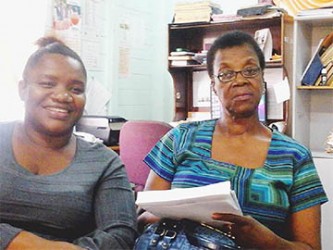There is an air of expectancy amongst Home Econo-mists as their umbrella organisation, the Guyana Association of Home Economists (GAHE) prepares to host the March/ April, 2014, 22nd Biannual Conference of the Carib-bean Association of Home Economists (CAHE). It is a prestigious assignment which the organisation – an interesting mix of youth and experience – has embraced with evident enthusiasm.
CAHE comprises Home Economists from across the English-speaking Caribbean, Puerto Rico, the United States and Australia, among other countries. Veteran Guya-nese Home Economist Janice Mason told Stabroek Business this week that it was not unlikely that as many as 300 CAHE members may converge on Georgetown for the forum. Neither Mason nor GAHE’s youthful Presi-dent, Cyril Potter College of Education Lecturer Stacia Skinner are under any illusions about the magnitude of the task ahead of them. Both expect, however,

that the planning of the event will secure the cooperation of both the public and private sectors and the expectation is that requests for one or another form of support might even find their way to the desk of President Donald Ramotar.
Simultaneously, there is another mission which the local planning committee seeks to use the March/April 2014 forum to accomplish. They are hoping that the event can help drive the process of both raising and readjusting the profile of Home Econo-mists and the discipline of Home Economics.
More specifically, CAHE is seeking to put a ‘spin’ on the marketing of next year’s forum that will draw local and perhaps even regional attention to what it sees as a nexus between Home Economics and other social and economic sectors of the Guyanese society. Skinner points to the coincidence between the planning of next year’s forum here in Guyana and the growing public discourse on tourism and hospitality, food and nutrition as a national health preoccupation and the delivery of services in what is a fast-expanding restaurant and snackette industry.
The Carnegie School of Home Economics has, over the years, made a noteworthy contribution to training workers in the hospitality sector but there is a distinct feeling among professional Home Economists that their talents and skills have been somewhat overlooked, particularly by the private sector where the limitations in the quality of service afforded patrons are evident.
And inevitably they raise the question as to whether – given all of the public discourse about better preparing ourselves for increased numbers of visitor arrivals, a point has not long been reached where we need to press the real professionals into service and afford them the requisite rewards. Mason talks about “the role of science” in Home Economics while Skinner says that at the Cyril Potter College of Education “we’re seeking to take the teaching of Home Economics to a higher level.”
Both Mason, who serves as a Consultant to GAHE and a link between the local organisation and its regional parent body and Skinner, say that one of the key responsibilities of GAHE is to remove what they believe is a stigma that continues to be associated with Home Econo-mics. They say that the stigma has even filtered into homes where some parents frown on their children being taught Home Economics. Skinner says that while she lectures at the CPCE she sees herself as a Home Economist. She believes that there are other purposes to which she can put her skills and she does not appear to have closed her mind to doing so.




